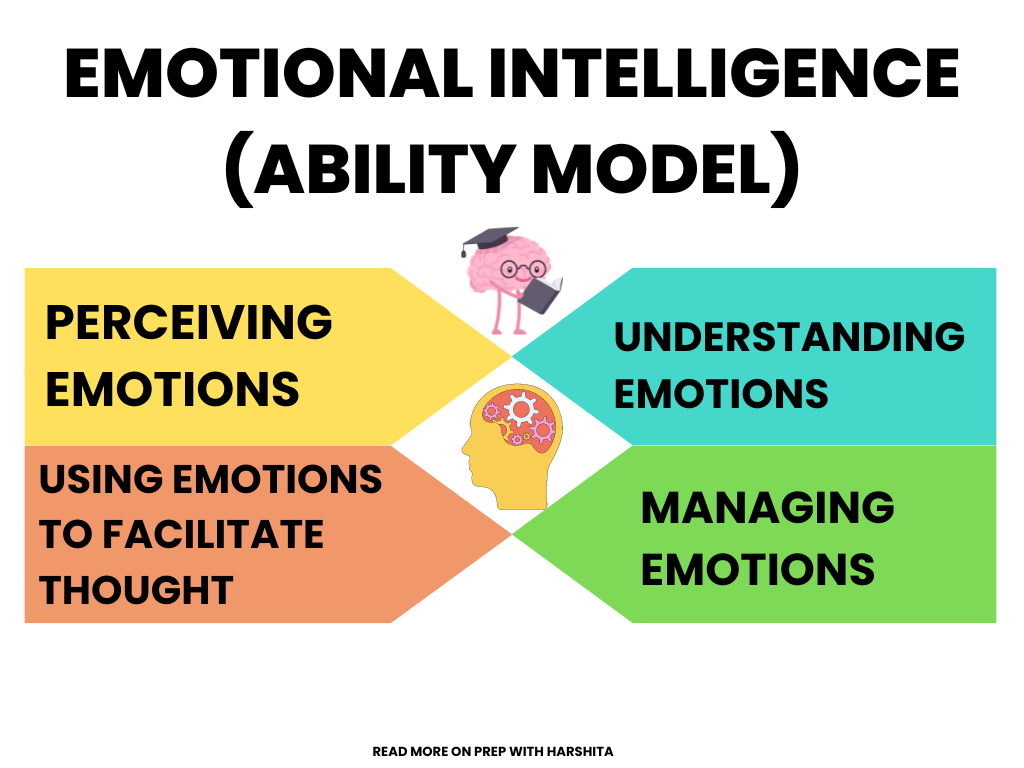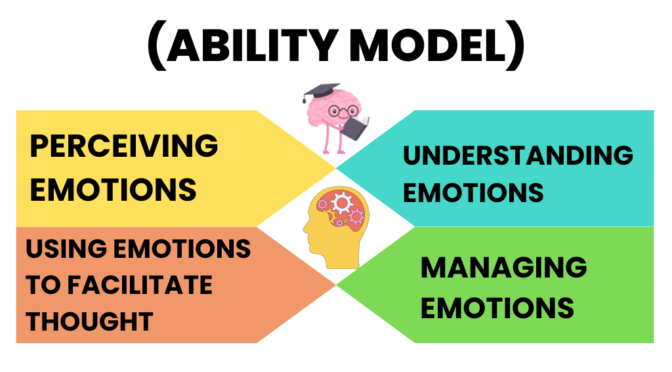Emotional Intelligence (EI) is a concept that refers to the ability to perceive, understand, manage, and use emotions effectively in various situations. The ability model of emotional intelligence, proposed by psychologists John Mayer and Peter Salovey in the early 1990s, conceptualizes emotional intelligence as a set of skills or abilities that can be developed and improved over time.
This Emotional Intelligence model outlines four key components of emotional intelligence:
Perceiving Emotions: This involves the ability to accurately perceive and recognize emotions in oneself and others as well as in objects, art, stories, music, and other stimuli. People high in this aspect of emotional intelligence are often sensitive to nonverbal cues such as facial expressions, tone of voice, and body language.
Using Emotions to Facilitate Thought: This refers to the ability to harness emotions to facilitate cognitive processes, such as problem-solving, decision-making, and creativity. Emotionally intelligent individuals can use their emotions to guide their thinking and adaptively solve problems.
Also Read: Gardner’s Theory Of Intelligence
Understanding Emotions: This involves the ability to comprehend the complex ways in which emotions operate and interact with one another. It includes understanding the causes and consequences of emotions, as well as the ability to recognize how emotions can change over time and in different situations.
Managing Emotions: This refers to the ability to regulate and manage one’s own emotions as well as the emotions of others. It includes strategies for effectively managing stress, controlling impulses, and maintaining emotional balance, as well as techniques for influencing the emotions of others and fostering positive interpersonal relationships.
Also Visit: Prep with Harshita



GLOBAL BUSINESS ELITE YOUR WHOLESALE SUPPLIER OF AGRICULTURAL AND INDUSTRIAL COMMODITIES
We are a global company providing food, ingredients, agricultural solutions and industrial products that are vital for living. We connect farmers with markets so they can prosper. We connect customers with ingredients so they can make meals people love. And we connect families with daily essentials from eggs to edible oils, salt to skincare, feed to alternative fuel. https://globalbusinessltd.co.uk/
Global business elite
copper cathode
aluminium wire scrap
scrap processor
scrap cpus
waste paper scrap
fridge compressor scrap
cable scrap
scrap copper wire
waste paper for sale
ceramic cpu scrap
icumsa 100
cpu scrap
wholesale sugar suppliers uk
scrap processor
scrap central processing units
occ paper scrap
occ waste paper scrap
nut prosper globe
ocopper cathode specifications
sachet water filling and sealing machine
insulated copper wire scrap
waste paper supplier
recycled copper wire
copper scrap wire
occ waste paper suppliers in uk
processor gold recovery
waste paper supplier
ccopper wire scrap millberry
Hi! Quick question that’s totally off topic. Do you know how
to make your site mobile friendly? My blog looks weird when viewing from my apple iphone.
I’m trying to find a theme or plugin that might be able to correct this issue.
If you have any suggestions, please share. Thanks!
It’s really a cool and useful piece of information. I am glad that you shared this useful info with us. Please keep us up to date like this. Thanks for sharing.
This is the fitting weblog for anyone who needs to find out about this topic. You notice a lot its virtually laborious to argue with you (not that I really would want…HaHa). You definitely put a brand new spin on a subject thats been written about for years. Nice stuff, just nice!
You got a very good website, Sword lily I found it through yahoo.
Well I truly enjoyed studying it. This post provided by you is very useful for good planning.
I gotta favorite this internet site it seems very useful extremely helpful
Many trackers you should buy are programmed to remind you that it’s a must to reach your goal.
my blog: 온라인카지노
Some genuinely interesting details you have written.Aided me a lot, just what I was looking for : D.